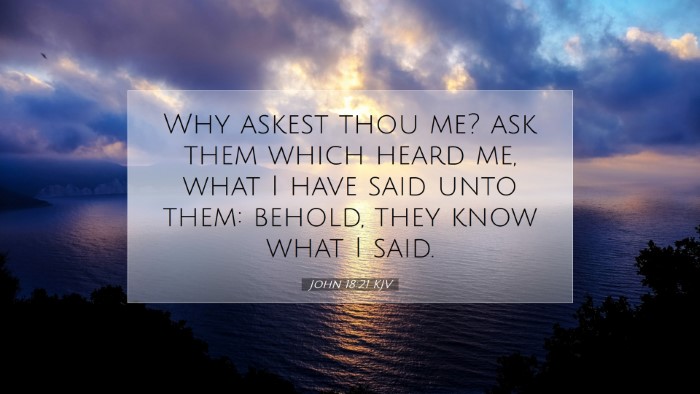John 18:21 Commentary
Verse: "Why askest thou me? ask them which heard me, what I have said unto them: behold, they know what I said."
Overview
In this passage, we find Jesus responding to the questions of the high priest during His trial. The context revolves around the themes of witness, truth, and the implications of Jesus’ teachings. Each public domain commentary offers valuable insights on the implications of this single verse, revealing the depth of meaning contained within it.
Matthew Henry's Commentary
Matthew Henry emphasizes the innocence of Jesus and His consistent demeanor even in the face of unjust questioning. He notes:
- Question of Authority: Jesus’ response suggests a profound understanding of His mission. He does not defend Himself through self-justification but directs the authority back to those who have heard Him. This emphasizes the credibility of His teachings and the personal witnesses who have encountered them.
- Call to Witness: Henry points out that by challenging the high priest to question the witnesses, Jesus is asserting that His words were not spoken in secret. The witness of others reinforces the testimony of His ministry, highlighting the communal aspect of truth in the Christian faith.
Albert Barnes' Notes
Albert Barnes provides a thorough analysis of the implications of this verse, noting:
- Clarification of His Teachings: Barnes notes that Jesus intentionally redirects the inquiry to those who had listened to Him. His teachings were intended to be public, with the implication that inquiring tongues should seek out those who can affirm His statements.
- Rejection of False Accusations: Barnes argues that Jesus does not engage in dialogue that could be misconstrued. His demeanor showcases how He upholds the truth amidst accusations, a model for believers when faced with slander or misrepresentation.
- Witnesses as a Key Component: The repeated emphasis on witnesses reveals that Christianity is a faith grounded in testimony. Barnes underscores that the authority of Jesus' words stands firm through the validation provided by those who have truly listened and understood.
Adam Clarke's Commentary
Adam Clarke's analysis of this verse provides a theological lens through which to view the actions of Christ:
- Challenge to Accountability: Clarke suggests that Jesus’ response challenges not just the high priest, but also readers of scripture to seek out reliable sources of truth. It sets a standard for accountability in the pursuit of knowledge and understanding.
- Distribution of Responsibility: The implication of turning to ‘them which heard’ denotes that the responsibility of truth extends beyond Jesus Himself. Clarke emphasizes the role of each believer in sharing the teachings they have received.
- Witness as Doctrine: Clarke highlights that the essence of Jesus' method lies in the declaration that His ministry was lived out in community with those who heard Him. This reinforces the doctrine that individual experience of faith should contribute to communal understanding.
Theological Implications
This verse encapsulates significant theological themes relevant for pastors, students, theologians, and scholars:
- Public Testimony: The nature of Christian witness is foundational to the faith. Jesus’ advocacy for the validation of His teachings through others serves as a model for sharing the Gospel and ensuring accountability in church communities.
- Authority and Interpretation: Understanding the authority of Jesus involves recognizing that His words carry weight not just through self-declaration but through the witness of believers. This challenges modern interpretations that isolate scripture from communal engagement.
- Response to Injustice: Jesus’ composed response in the face of hostility serves as a guide for believers in dealing with persecution. The stance of maintaining integrity and directing inquiry towards truth stands as an example of Christ-like behavior.
Practical Applications
In light of this verse and the insights gleaned from the commentaries, here are practical applications for believers:
- Emphasize Community: Engage in community discussions about faith, ensuring that personal testimonies and scriptural teachings are shared collectively to build each other up in understanding.
- Commit to Truth: Seek out truth through attentive listening and discerning of teachings, encouraging others to do the same. Discernment in faith and practice is vital in maintaining the integrity of the Gospel.
- Embody Christ’s Attitude: In moments of personal challenge, emulate Jesus by responding with grace and redirecting to the broader community of believers, trusting in the shared knowledge and witness of God’s work.


